My great grandmother, Jennie Virginia Allen, was born October 1, 1866 in Montgomery Alabama, seven months after the end of the Civil War and the ratification of the 13th Amendment abolishing slavery. She was the forth child of formerly enslaved Eliza and Dock Allen. Her mother was a seamstress and her father was a carpenter. The girls were taught the seamstress trade while the boys were taught the carpenters trade. She married Howard Turner in 1887 when she was 20 and Howard was 23. My grandmother Fannie was born the following year. According to the 1940 Census she completed the sixth grade.
Below are my mother’s memories of her grandmother.
Memories of grandmother
By Doris Graham Cleage
Today I’m going to write about Grandmother. Grandmother Turner was born about 1872, nine years after the Emancipation Proclamation. Don’t know if she finished high school – but she did go. Her mother taught her to sew and it was a good thing she did because grandmother worked the rest of her life supporting herself and her children at sewing. That is, she worked after husband Howard Turner died. They married when she was about sixteen. Don’t know his age. He looked something like grandmother’s father and also like my father, mother said. He was a farmer’s son from around Hayneville, AL, but he preferred the big city – Montgomery. His father had three sons and planned to give each one a large share of the farm when they married. Howard and Jenny received their farm, but neither one liked the country. One day they were in Montgomery. He was at a Bar-B-Q. She was at her parents with their daughters, Fannie Mae, 4, and Daisy Pearl, 2. someone brought word that he had been shot dead. Apparently no one ever knew who did it, but mother always said grandmother thought his father had it done because he was angry that Howard would not farm and had even been talking about selling his part. The father did not want the land sold, but wanted it to stay in the family forever. (Bless his heart!). He and the son had had some terrible arguments before they left to come to the Bar-B-Q. I often wondered why he was there and grandmother wasn’t. She always seemed to like a good time.
I remember her laughing and singing and dancing around the house on Theodore. She was short, about five feet I guess, with brown eyes, thin dark brown hair that she wore in a knot. She was very energetic, always walking fast. She always wore oxfords, often on the wrong feet, and never had time to change them. We used to love to tell her that her shoes were on the wrong feet. (smart kids!)
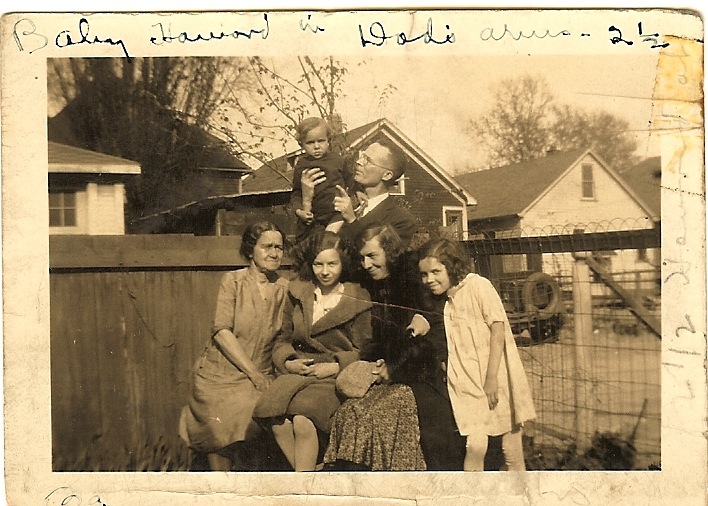
In back Howard and father Mershell Graham. Detroit about 1932
She never did things with us like read to us or play with us, but she made us little dresses. I remember two in particular she made me that I especially liked. My “candy-striped” dress – a red white and blue small print percale. She put a small pleated ruffle around the collar and a larger one around the bottom. I was about five, I guess, and I really thought I was cool! The other favorite was an “ensemble” – thin, pale green material with a small printed blue green and red flower in it – just a straight sleeveless dress with neck and sleeves piped in navy blue – and a three – quarter length coat of the same material – also straight -with long sleeves and lapels – also piped in navy blue. She never used a pattern. Saw something and made it! She taught us some embroidery, which she did beautifully but not often. She never fussed at us – never criticized – and I think she rocked me in the upstairs hall on Theodore when I was little and sick. The rocker Daddy made stood in that hall. I remember lots of people rocking in that chair when I was small.
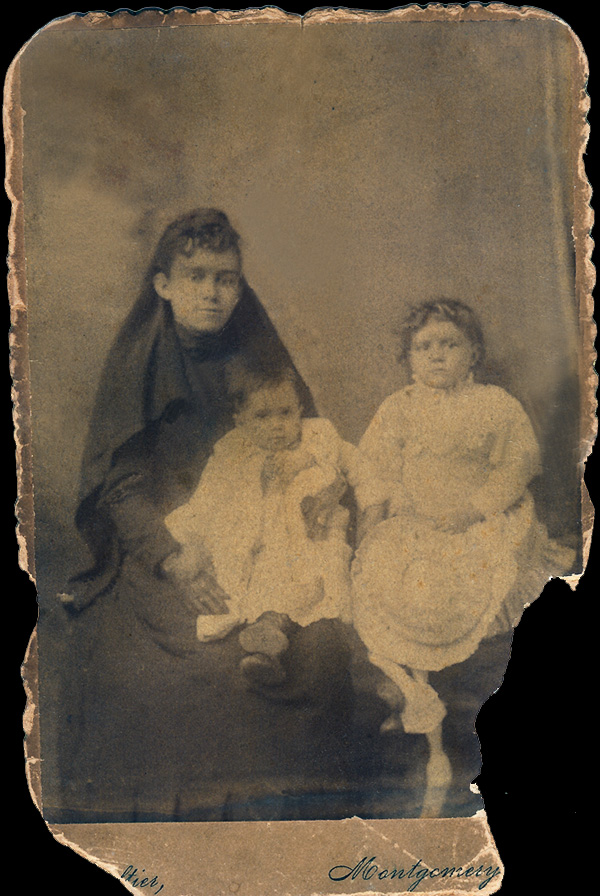
Grandmother went to work when her husband was murdered – sewing for white folks – out all day fitting and sewing – and sewing all night – finishing while mother and Daisy stayed with their Grandfather Allen, who would tell on them when Grandmother came home and she would spank them. Mother said she remembered telling Daisy to holler loudly so Grandmother wouldn’t spank them hard or long and it worked!
Grandmother stayed single until she was about 37 or 38 when she married someone Mother hated – looked Italian, hardly ever worked. Liked a good time. Fathered Alice and left when she was very small. Somehow when mother spoke of him I had the feeling he would have like to have taken advantage of her. She was about 20 and had given up two college scholarships to stay and help Grandmother.
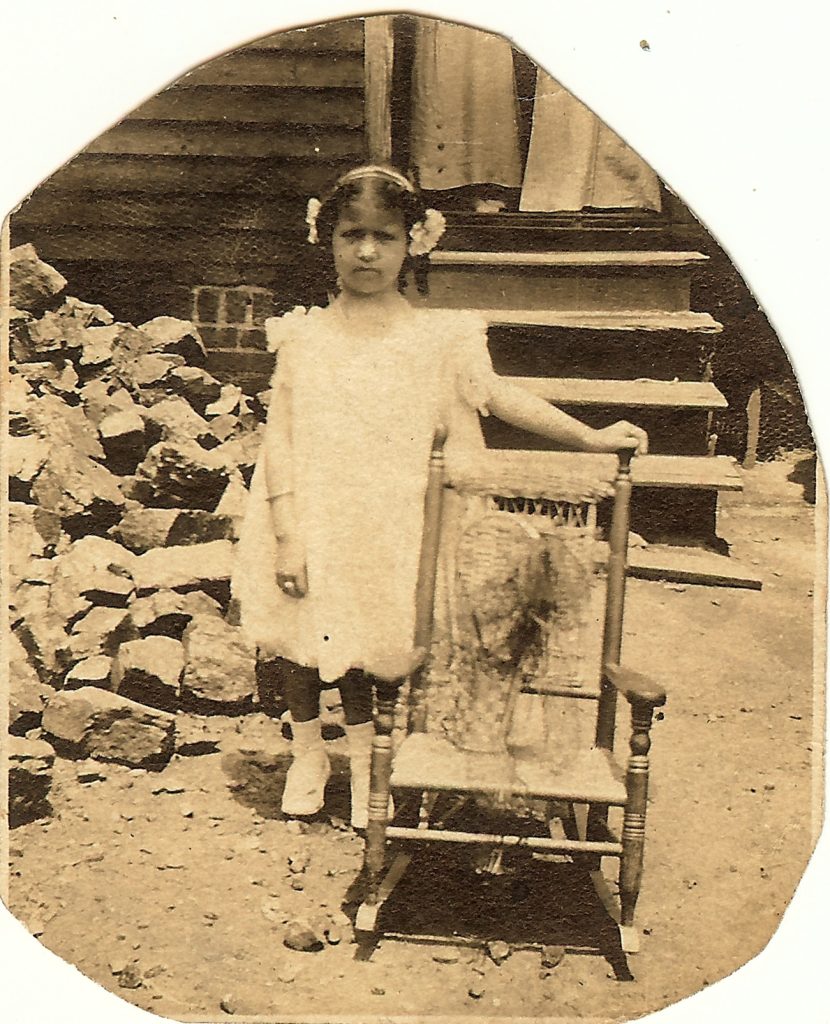
Sometimes after her husband’s death, Grandmother took the deed to the farm to a white lawyer. (was there any other kind?) and told him to sell it for her. He went to see it and check it out – told her to forget it – her title wasn’t clear, but he never gave the deed back and she figured he made a deal with her father-in-law. (The rest of the land story.)
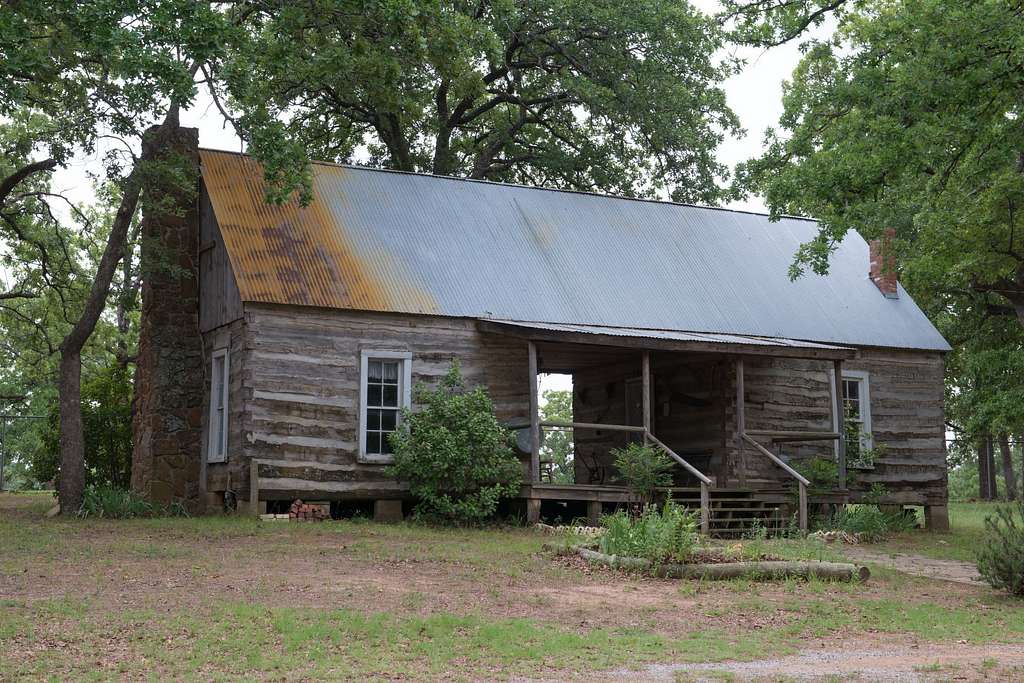
Aunt Abbie (note: Jennie’s sister) said the father-in-law built Grandmother and Howard a “shotgun” house on the farm. She would turn up her nose as she said it. You know that is a house like this – no doors on front or back, you could shoot a gun through hall without damage. Animals (pigs, dogs) would wander into the hall and have to be driven out. Aunt Abbie only stayed there when the plague was raging in Montgomery. Yellow fever (malaria) and/or polio every summer. Many people sick or dying. Huge bonfires in the streets every night to ‘purify’ the air”, and closing the city if it got bad enough – no one in or out. More than once they fled the city in a carriage through back streets and swamps because they were caught by the closing which was done suddenly to keep folks from leaving and spreading the “plague”
In Detroit, when they came in 1923 when Mother and Daddy had bought the house on Theodore and had room for them (room? only 5 adults and 3 children!) Grandmother, Daisy and Alice got good jobs, (they were good – sewing fur coats, clean work and good pay.) at Annis Furs (remember it back of Hudsons?) and soon had money to buy their own house much farther east on a “nice” street in a “better ” neighborhood (no factories) on Harding Ave. While they lived with us I remember violent arguments between Alice and I don’t know who – either Grandmother or Daisy or Mother. Certainly not Daddy because when he spoke it was like who in the Bible who said, “When I say go, they goeth. When I say come, they cometh.” Most of the time I remember him in the basement, the backyard or presiding at table. Daisy and grandmother were what we’d call talkers.
Grandmother got old, hurt her knee, it never healed properly. Daisy worked and supported the house alone. Alice only worked a little while. She had problems getting along with people. Grandmother was eventually senile. Died of a stroke at 83 or so. Alice spent years taking care of her while Daisy worked. Daisy added to their income by being head numbers writer at Annis!!
I got this from Wikipedia about playing the numbers. “The numbers game, also known as the numbers racket, the policy racket, the Italian lottery, the policy game, or the daily number, is a form of illegal gambling or illegal lottery played mostly in poor and working class neighborhoods in the United States, wherein a bettor attempts to pick three digits to match those that will be randomly drawn the following day. In recent years, the “number” would be the last three digits of “the handle”, the amount race track bettors placed on race day at a major racetrack, published in racing journals and major newspapers in New York.
Gamblers place bets with a bookmaker (“bookie”) at a tavern, bar, barber shop, social club, or any other semi-private place that acts as an illegal betting parlor. Runners carry the money and betting slips between the betting parlors and the headquarters, called a numbers bank or policy bank. The name “policy” is based on the similarity to cheap insurance, which is also a gamble on the future.[1]”
I think the numbers writer – Daisy in this case, would take the bets in the store (the numbers people picked and their bet money) and pass them along to the numbers runner, who would take them to the center. She would get a cut.
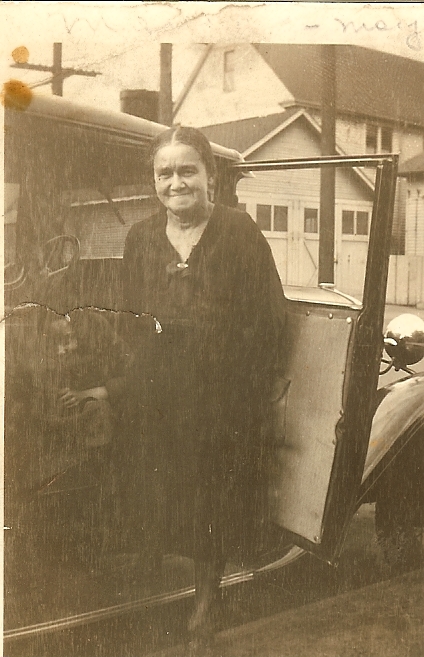
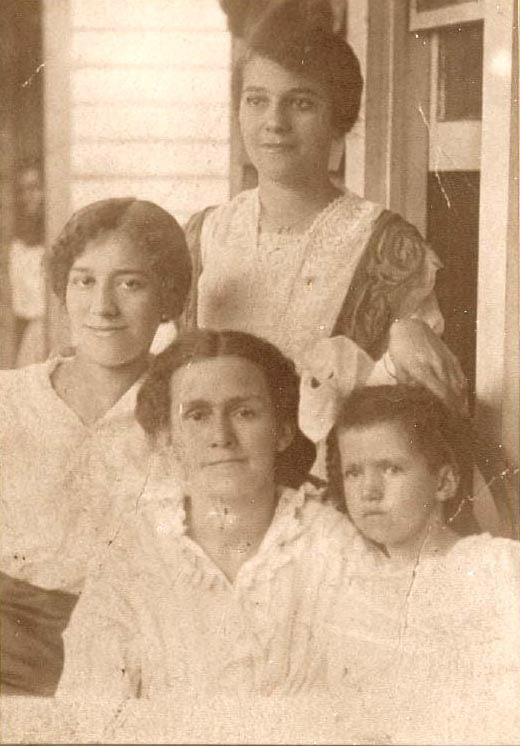
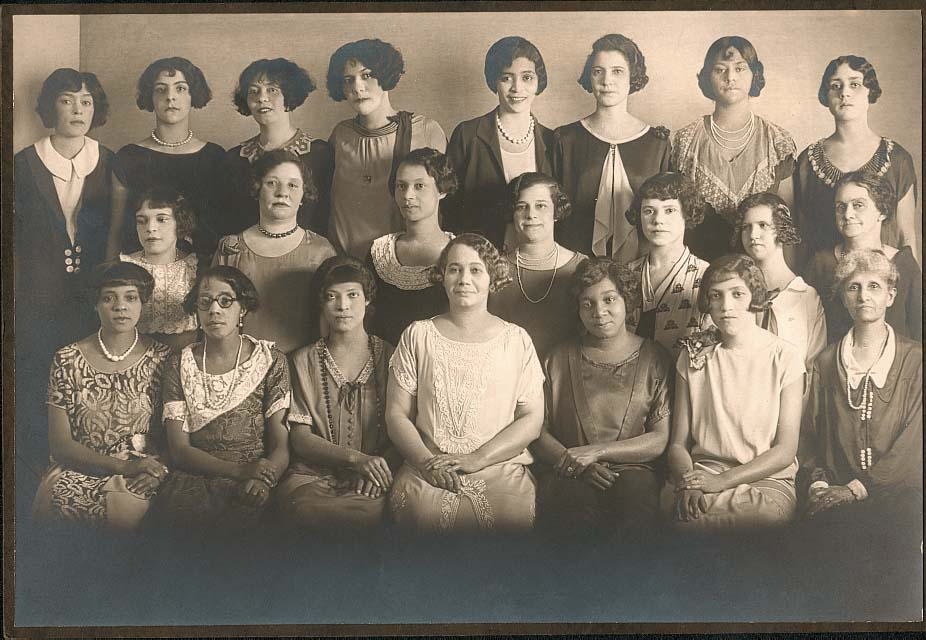
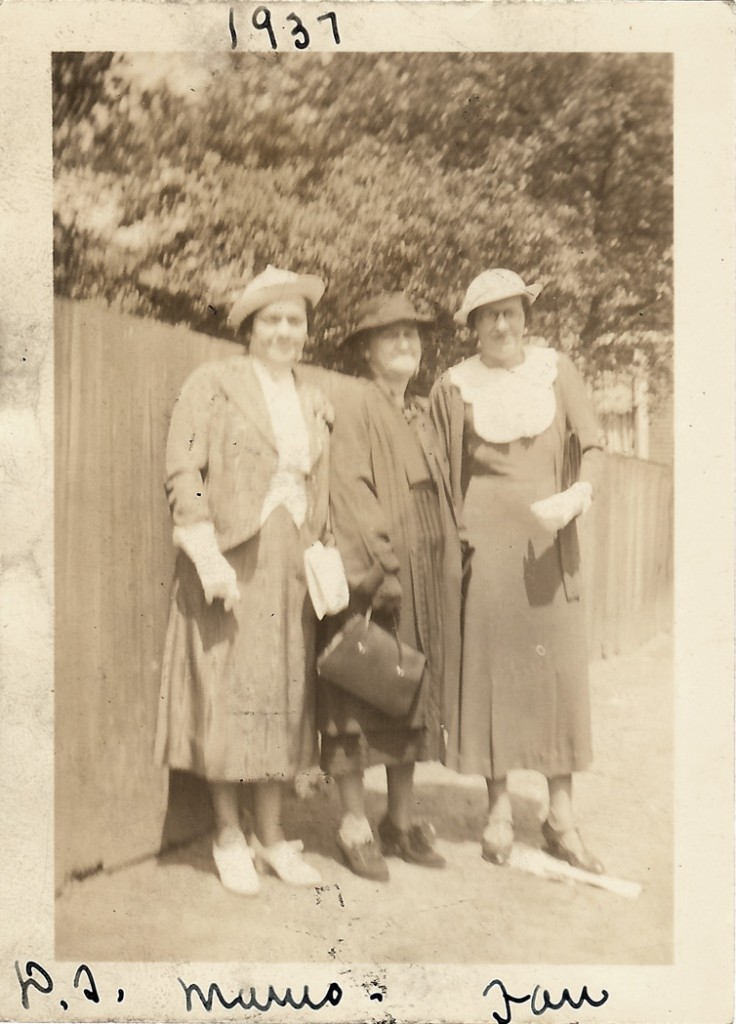
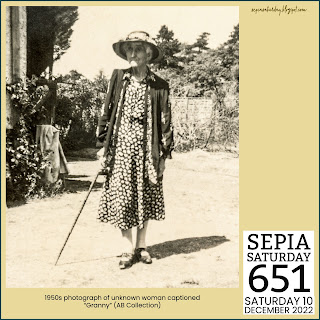
What a great story of your great grandmother. She had a really full life. I didn’t understand the last sentence…”head numbers writer at Annis.” What did that mean?
I added what the numbers writer would do up there at the end of the post. The numbers were an illegal lottery before the governments took over with legal lotteries.
But what is Annis? The story has all the elements murder, deceit, family and pretty dresses too!
Annis was a fur store. I did a post on it and will add a link.
And great to see you here Ayanna!
I enjoyed reading your mother’s account of her grandmother. It’s rare to have that kind of conversational remembrance that preserves a real voice talking about an older ancestor even if the details might be incomplete. Your story also reminds us that some families could not depend on just traditional men’s work like framing and carpentry. The work women did was often even more crucial to support a family, especially after a husband’s death or disability.
Both my grandmothers came from rural farming families and learned needlework and sewing skills from their mothers. I have a few bits of old clothing, cloth toys, and even a rag rug that I know date back to my great grandmothers’ time – 1890s or even earlier. Considering the challenges that women faced back then it was important to teach young girls a useful craft, not just for family but for employment too. We have to wonder if that heritage is still being taught anymore.
It’s not. People don’t have time and kids aren’t interested most of the time.
Yes it was vital to the families and ever skill people had helped educate the children, buy a house or land. I used to have a quilt my great grandmother made. It got lost in one of my many moves and I don’t even have a picture of it, except in my memory.
Interesting to have some memories from previous generations written down like that!
It really rounds out the people and in a different way when it’s written down.
It’s interesting that your family used the term “Bar-B-Q” to describe the event where Howard Turner was killed rather than the term “picnic” that the newspaper clipping in your other post used. My impression is that southern men often attended Bar-B-Ques which were men-only gatherings and were often political in nature. The fact that Jennie went to her family’s with the children and did not attend with him further suggests to me that this was not a family picnic activity but maybe more of a men-only event. I also tried poking around in a newspaper database to find more, but as yet have found nothing about the shooting.
HOWEVER, I did find a marriage announcement for Jennie V. Allen and Howard Turner that was in a Huntsville newspaper. Do you need it?
I had a feeling it was a men only affair. By the time of the event I believe my great grandparents had moved to Montgomery. In the article it said Howard was “of this city”. I have searched for more information about the McCall who killed him, but have found no other newpaper items, aside from the one I shared.
They were married in Montgomery, where Jennie lived with her parents and siblings. Howard was from Lowndes County. I have their marriage certificate.
The marriage announcement is very interesting. I think you will want it if you don’t have it. Also, I kept poking around, looking for information on Phillip McCall, and found a lengthy article about the blind poet James Edward McCall. It states that his mother was Mary Allen, the daughter of Doc Allen, the carpenter. However, it also makes the statement that she was born into slavery and was owned by Col Edmund Harrison. I can’t figure out how to get these to you. If you want to make a comment on my latest blog post with your email address in it, I won’t publish your comment. All of my comments are moderated, so they don’t automatically publish. Or you can find my email address in my profile.
I’m looking for the announcement, but can’t find it! What year?
James Edward McCall was my grandmother’s first cousin and his mother Mary was Jennie’s older sister. I wrote about that article in an earlier blog post.
This blog is a monument to the value of interviewing older family members about their/our ancestors. Capturing these stories, as you have done here, are so valuable to tie together dry documents into a meaningful family history. One of my great-grandmothers, daughter of my Union Army ancestor Arthur Bull, was also born in 1866. Perhaps there was a baby boom of sorts once the brutal system of enslavement was defeated? Your great-grandmother Jennie led a quietly heroic life as part of that post-war generation, working and raising her children and living into her 80s. A truly remarkable woman.
My mother was only in her 50s when she wrote a series on her parents, grandparents and great grandparents plus aunts and uncles. She died when she was 59 when she died so I’m glad she didn’t wait to write.
Jennie’s mother the Eliza of this blogs name, birthed 12 children before and after the war, so I don’t think there was a special baby boom. But maybe there was!
Great and intriguing storytelling. Were there no long-term consequences or riffs in the fabric of that family for a seemingly senseless murder within the family?
I can’t believe I didn’t include the consequences in this. Yes there was a permanent riff between my great grandmother and her inlaws and her daughters. Although I do remember a story that my grandmother met one of her cousins in later years, before she left Montgomery and he told her that their grandfather Joe Turner did not get the land either. So she must have had enough contact that the cousins recognized each other.
I have so many stories and memories of Grandmother Turners side of the family and only the arguments, murder and land loss for the Turner side. I have had to rebuild that through documents, news articles and a little input from Turner cousins that I made contact with.
Thanks for the follow up. You are both a brave and transparent family storyteller.
I want to find and tell the stories.